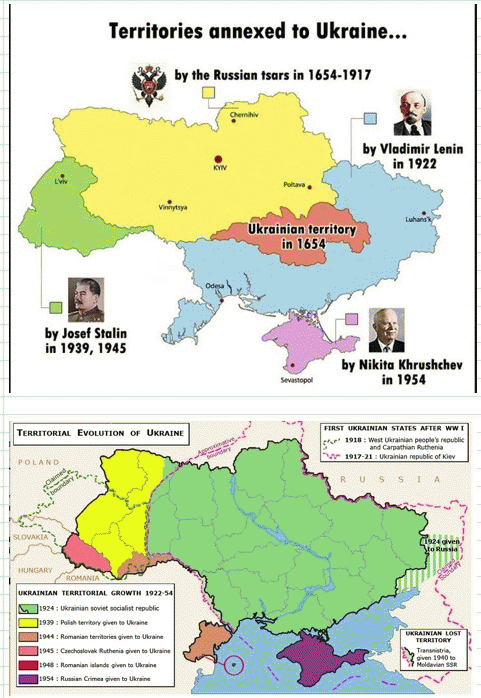Proponents of
"humanitarian intervention," e.g., officials like UN Ambassador
Samantha Power, are quick to use the "Responsibility to Protect"
(R2P) provision of the UN charter for military intervention in situations where
the lives and rights of masses of innocents are being violated. In a
recent article,
Robert Parry describes how the R2Pers, e.g. the Obama administration's UN
Ambassador Samantha Power, have teamed up with Obama administration neocons to
pressure Ukraine to turn to the west and away from Russia.
The neocons and R2Pers, often self-righteous to a fault, are quick to counsel meddling in Ukraine despite their failures in Iraq, Libya, and other places. As the saying goes, the road to hell is paved with good intentions. They appear to be either willfully ignorant of the complexities and uncertainties of international relations, which often result in bad blowback effects as in Libya's continuing instability spreading to Mali, or more likely are using humanitarian concern opportunistically as an excuse for the exercise of their faith in the "benevolence" of a Pax Americana, wishing now to sprinkle it on Ukraine.
Borders and discontents: Breaking up is hard to do
National borders are usually a result of power struggles between expansionist political/military powerhouses who don't care that much about those ensnared in borders forced on them. The bloody history of the US is a good example, with Mexican and Native American populations being taken over and betrayed for the sake of territorial expansion. Ukraine as currently constituted is another example. Prior to 1939, Ukrainian nationalism was quite active in the westernmost parts of present-day Ukraine, then under the control of Poland, but the central and eastern parts were in the Russian Soviet Federative Socialist Republic (RSFSR). Then in 1939 Stalin forcibly took over the western parts and joined them with Ukraine to enlarge the Ukrainian SSR.
Numerous maps of Ukrain's evolution are available on the internet. The reader is referred to one map that goes back to 1654. Another map shows in more detail the evolution of borders in the 20th Century.
In the current crisis, the status of Crimea deserves special mention. Crimea, like the rest of Ukraine, was part of the USSR, but not a part of the Ukraine SSR until 1954 when Khrushchev stuck it into Ukraine with a degree of autonomy from the central government in Kiev, a decision about which the Crimeans had no say at all. Well, Crimeans had a voice a few months ago, and whatever the shortcomings of the election process were, there is little doubt they wanted out of the discriminations they have felt for years under Ukraine's Kiev government and prefer Russia instead. Will they regret this decision? Time will tell.
In spite of Ukraine's border history, neocons and R2Pers would like everyone to think the borders, like those of other countries they favor, are not to be tampered with. Referenda on May 11 gave people in several regions in eastern Ukraine--particularly the major cities Donetsk and Luhansk--the opportunity to vote on independence from the central government. The elections followed several weeks of attacks on secessionists, labeled "terrorists" by the central coup government. The attacks have resulted in the fire-bombing in several cities, including one in Odessa in which 40 secessionists were burned to death or died from smoke. Like all elections carried out in the midst of conflicts, their validity can be legitimately questioned, though it appears that there is a sizable majority of eastern Ukrainians who are fed up with the excessive power of Kiev over their regions. Indeed, regional governors are not even elected by those they serve, but are appointed by the central government.
Viable nationhood requires a sufficiently strong sense of shared cultural, linguistic, and political appreciation and tolerance, plus a system of uniform economic and legal treatment of all regions. Foolishly, the knee-jerk reaction of neocons, R2Pers, and their naive if well-intentioned supporters in the public is to treat every popular uprising against a government the US doesn't like as an expression of "democracy in action" worthy of moral, if not material, support by the American superpower, supposedly the world's beacon of democracy despite the high hypocrisy of this claim. Needless to say, Ukraine as currently constituted is a mixed bag in all these regards.
Never mind if the Maidan protesters represented only a specific geographical portion of the country plus a self-interested group of oligarchs and right wingers/fascists, while other regions oppose the coup government and continued domination by Kiev. Like it or not, we should avoid referring to "Ukraine" as a single country when discussing the current crisis. "Eastern Ukraine" and "western Ukraine" is a necessary distinction, which is not to say that every one in Ukraine would want to be cast in these terms. For example, older folks in the east might want to be part of Russia, but there is evidence that the younger ones prefer a western orientation for the country.
(Note: You can view every article as one long page if you sign up as an Advocate Member, or higher).





